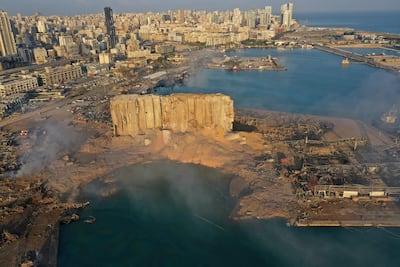Times were tough in the 1850s. Even in the most developed countries, life expectancy at birth was around 40 years. By today's standards, the vast majority of people lived in poverty. By the end of the decade, the world had witnessed what some now consider to be the first truly global economic crisis, when in 1857 the failure of a major US insurance and trust company led to a collapse in the American banking system, with repercussions felt in Europe and East Asia.
There have, since then, been other economic crashes, national and international. Few, according to a new report by the World Bank, have been as bad as the one being endured in Lebanon today. The report, titled Lebanon Sinking: To the Top 3, goes so far as to conclude that Lebanon's economic crisis could be among the three most severe economic calamities that the world has seen since the Panic of 1857.
Any sense of panic the report induces is long overdue, as figures from the past three years show. More than half of Lebanese are now living in poverty. GDP is thought to have dropped nearly 40 per cent since 2018, and the value of the Lebanese lira dropped by 85 per cent from 2019 to 2020. Food prices have almost tripled.
A leadership vacuum that has seen politicians wrangle for months on end over control of various ministries, with seemingly little interest in actual policymaking, is both a cause and an amplifier of the crisis. Compounding it is Covid-19, as well as the fallout from last summer's Beirut blast, one of the largest non-nuclear explosions in history.
This week, Pope Francis said he plans to bring leaders of Lebanon's Christian communities to the Vatican to discuss the country's deterioration, and to pray for "the gift of peace and stability". Meanwhile, protesters took to the streets after Lebanon's highest court decided to suspend a Central Bank measure that allowed customers to withdraw their dollar savings in local currency at a rate higher than was pegged officially.
The economic meltdown has made worse the political and sectarian fragmentation of the country, undermining an already-weak rule of law. The dominance of rival militias in different parts of Lebanon has long been the norm, but now some of the political parties that control them have created competing economic regimes, too. Hezbollah has opened its own supermarkets, which are thought to import food from Syria illegally. In April, The National wrote about how rampant organised crime was jeopardising Lebanon's food exports, after an amphetamine-laden shipment of Lebanese pomegranates to Saudi Arabia led to a diplomatic and trade crisis.
Even more damning than the World Bank's report was a document accompanying it, referring to the state of governance in Lebanon as being one of "deliberate inaction" by the political class. It is strong language for an international organisation known for reserved and dispassionate economic assessments. Still, for many frustrated Lebanese, who have witnessed the deliberate actions that brought their country to this point, it will not fully capture the severity of their plight.



